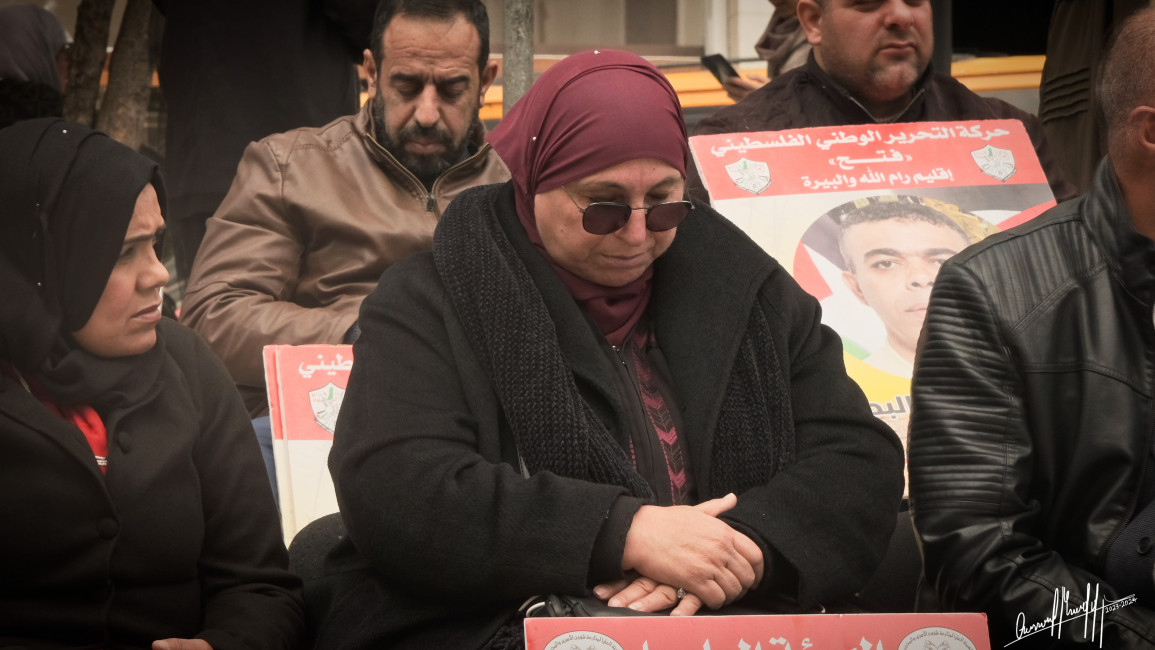At least 27 Palestinians have died in Israeli jails since 7 October
At least twenty-seven Palestinian detainees from the Gaza Strip have died in Israelí jails since 7 October, an investigation by the Israeli daily Haaretz said on Thursday.
According to Haaretz, most of the detainees died in the detention facilities of "Sde Teiman" in the northern Negev and "Anatot", located northeast of Jerusalem in the occupied West Bank.
Haaretz quoted the Israeli army claiming that some detainees either "suffered from prior health conditions or were injured during the war".
Last week, the Palestinian Prisoners' Club said that it had identified 12 detainees who died in Israelí jails since 7 October, following the death of 78-year-old Rizeq Qideih, announced on Saturday by the Palestinian Prisoners' Club.
Haaretz newspaper reveals Israel's killing of 27 detainees from Gaza after October 7th in detention camps near Be'er Sheva and Anatot in Jerusalem, and other investigation centers, without the Israeli army providing information about these deaths.https://t.co/wsHoPu4eIk
— Ramy Abdu| رامي عبده (@RamAbdu) March 7, 2024
Qideih was arrested by Israeli forces in early February in Khan Younis, south of the Gaza Strip, and then reportedly taken to the Karem Shalom Israeli checkpoint.
According to the Prisoners' Club, who quoted an unnamed released Palestinian who shared detention with Qideih, the elderly Palestinian was beaten and kept in inhumane conditions, and the last thing he asked was to wash himself and some food.
Last Thursday, the Prisoners' Club announced the death of 22-year-old cancer-stricken Asef Refai in the Israeli Asaf Harofeh hospital.
Refai was arrested in September 2022 for the third time in his life at the age of 20. He was diagnosed with colon cancer shortly after his release from his second arrest.
Cancer-stricken Palestinian prisoner Asef Al-Refaai, 22, passed away as a result of inhumane conditions in illegal Israeli prisons.
— Al-Jarmaq News (@Aljarmaqnetnews) February 29, 2024
It is worth noting that Asef was transferred to Assaf Harofeh Hospital on Sep 24, 2022, following a serious deterioration in his health conditions. pic.twitter.com/LCh5py9Bbp
Last Saturday, his father told Palestinian media during a march in Ramallah in protest of his son's death that his son "died because of medical neglect by the occupation".
"The occupation took Asef's medical reports when they arrested him, but the Ofer prison administration refused to recognise that he had cancer for five months, and when his health completely deteriorated, they began to treat him", said the father.
"The last time I visited Asef in jail was in September, a month before the current war started, and we had no news about him until his lawyer was able to visit him a month ago. The news the lawyer brought was very bad, as Asef's health was very deteriorated, and today our worst fears became true: Asef, my son, has died", he added.
Palestinian human rights groups have been warning that the detention conditions of Palestinians in Israeli jails have severely deteriorated since 7 October, going back to detention conditions applied by Israeli authorities in the 1980s. These include overcrowded cells, poor food quantity and quality, repeated isolation and beating.
On Thursday, the Palestinian Commission for Prisoners and Detainees Affairs reported that detention conditions in the Israeli Gush Etzion detention centre, north of Hebron, were "tragic".
The commission said that its lawyer, Palestinian attorney Jackeline Farajeh, visited the detention centre recently and met 30 out of the 110 Palestinians held there.
According to Farajeh, detention cells are so overcrowded that detainees take shifts to use the beds for sleep. The lawyer reportedly also said that detainees are facing very little and subpar food quality, severe shortage of clothes, medical neglect, and are forced to stay the entire day inside the cells.
Since 7 October, Palestinian human rights groups have been warning of the blackout imposed by Israel on Palestinian prisoners and detainees, especially detainees from the Gaza Strip arrested during the war.
In November, Palestinians released during the Hamas-Israel deal shared testimonies of abuse and torture in Israeli prisons. Earlier in February, the UN experts said in a report that at least two female Palestinian prisoners were facing sexual abuse.
Meanwhile, Palestinian prisoner support groups have suspended all communication with the International Committee of the Red Cross in protest to what they consider "inaction" towards deteriorating conditions for Palestinian prisoners held by Israel.



